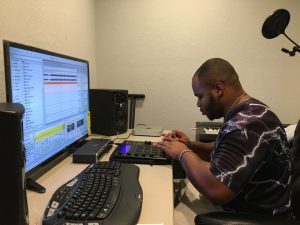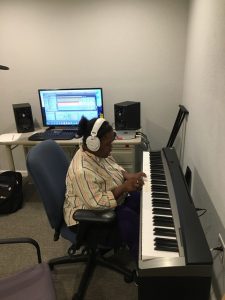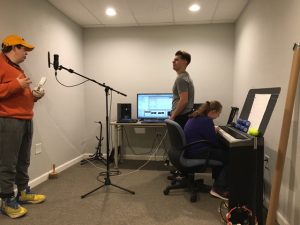 Using Music as Therapy
Using Music as Therapy
“When I graduated from IBC, I prayed that God would give me a job where I had a sense of fulfillment and an opportunity to impact others,” says Aaron Romine, music therapist at Aspiring Hands Inc in Toledo, Ohio. “God has truly answered that prayer.”
Bro. Romine continues, “Aspiring Hands is a community-based company that helps adults with special needs. I was hired to work in music production/therapy for these adults providing a way for individuals to create and express themselves through music. I administer music therapy to our clients while teaching them the fundamentals of music production, theory, and songwriting. On a day to day basis, we deal with a numerous amount of adults with many different types of diagnoses, personalities, and interests. It is my job to pull out those different personalities with music.”

“Every day presents new challenges. We complete a numerous amount of musical exercises with percussion instruments, MIDI drums, piano/synths, singing, etc. Rhythm exercises are perfect for sharpening the mind, increasing focus in the brain, and strengthening reaction time. These rhythm exercises have especially helped our clients diagnosed with cerebral palsy.”
“For example, a client will create a melody line on a particular synth that they like, then they will add a pad sound to the melody line, then maybe a bass line, and so on and so forth. Another example: one client may explore making a beat on a drum pad and another client may add a shaker to the track. After getting many ideas recorded, I then will loop certain sections and we start building different parts of a song. Before you know it, you have a 4-5 minute song that our clients can write lyrics to. To see the expression on my clients’ faces when they come up with a cool idea is simply priceless.”
 “Songwriting is another important achievement with our clients. Often times, we will have many collaborative songwriting sessions where the clients will brainstorm together and write down ideas. Our clients will write what they are feeling, their likes and dislikes, their dreams, and what makes them happy. They will even portray their fears, struggles, and purpose in life while they talk about friends and family.”
“Songwriting is another important achievement with our clients. Often times, we will have many collaborative songwriting sessions where the clients will brainstorm together and write down ideas. Our clients will write what they are feeling, their likes and dislikes, their dreams, and what makes them happy. They will even portray their fears, struggles, and purpose in life while they talk about friends and family.”
“I also use music therapy to provide an environment of calmness that lowers anxiety and hyperactivity. Our clients are given the opportunity to explore various synth and pad sounds that trigger different emotions and distract them from negative stimuli in their brains. Music is truly an escape to many of our clients.”
“It is my desire to make others more aware of the power of music to help individuals with special needs. To know that these music sessions are an escape to the chaotic lives they live is so rewarding to me. I truly consider this position as a ministry and an opportunity to pour into these people what was poured into me by others.”

